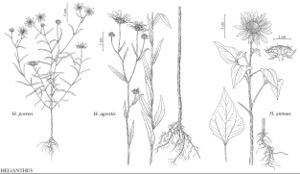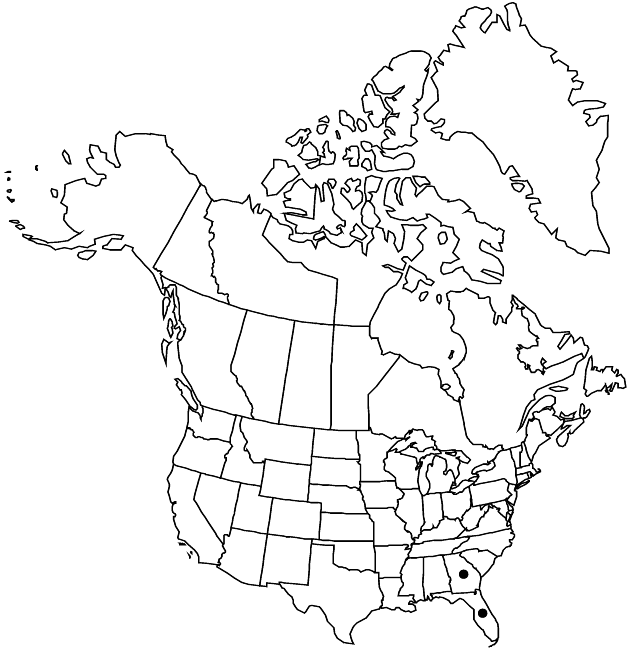Difference between revisions of "Helianthus agrestis"
Proc. Biol. Soc. Wash. 13: 184. 1900.
FNA>Volume Importer |
imported>Volume Importer |
||
| (6 intermediate revisions by 2 users not shown) | |||
| Line 8: | Line 8: | ||
}} | }} | ||
|common_names=Southeastern sunflower | |common_names=Southeastern sunflower | ||
| + | |special_status={{Treatment/ID/Special_status | ||
| + | |code=F | ||
| + | |label=Illustrated | ||
| + | }}{{Treatment/ID/Special_status | ||
| + | |code=E | ||
| + | |label=Endemic | ||
| + | }} | ||
|basionyms= | |basionyms= | ||
|synonyms= | |synonyms= | ||
| Line 24: | Line 31: | ||
|elevation=0–50+ m | |elevation=0–50+ m | ||
|distribution=Fla.;Ga. | |distribution=Fla.;Ga. | ||
| − | |discussion=<p>Distinctive among species of Helianthus with an annual habit in having a combination of reddish disc corolla lobes and yellow style branches, H. agrestis is also characterized by its glabrate stems and phyllaries and by relatively long hairs on the petioles and basal margins of the leaves.</p> | + | |discussion=<p>Distinctive among species of <i>Helianthus</i> with an annual habit in having a combination of reddish disc corolla lobes and yellow style branches, <i>H. agrestis</i> is also characterized by its glabrate stems and phyllaries and by relatively long hairs on the petioles and basal margins of the leaves.</p> |
|tables= | |tables= | ||
|references= | |references= | ||
| Line 33: | Line 40: | ||
-->{{#Taxon: | -->{{#Taxon: | ||
name=Helianthus agrestis | name=Helianthus agrestis | ||
| − | |||
|authority=Pollard | |authority=Pollard | ||
|rank=species | |rank=species | ||
| Line 47: | Line 53: | ||
|publication title=Proc. Biol. Soc. Wash. | |publication title=Proc. Biol. Soc. Wash. | ||
|publication year=1900 | |publication year=1900 | ||
| − | |special status= | + | |special status=Illustrated;Endemic |
| − | |source xml=https:// | + | |source xml=https://bitbucket.org/aafc-mbb/fna-data-curation/src/2e0870ddd59836b60bcf96646a41e87ea5a5943a/coarse_grained_fna_xml/V19-20-21/V21_344.xml |
|tribe=Asteraceae tribe Heliantheae | |tribe=Asteraceae tribe Heliantheae | ||
|subtribe=Asteraceae (tribe Heliantheae) subtribe Helianthinae | |subtribe=Asteraceae (tribe Heliantheae) subtribe Helianthinae | ||
Latest revision as of 20:11, 5 November 2020
Annuals, 100(–200+) cm. Stems erect, glabrous or glabrate (glaucous). Leaves mostly cauline; mostly opposite; petioles 0.5–1.2 cm; blades (often 3-nerved distal to bases) lanceolate, 6–11 × 0.7–1.9 cm, bases cuneate, margins ± serrate, faces scabrous, not gland-dotted. Heads 1–15. Peduncles 2–8 cm. Involucres hemispheric, 10–15 mm diam. Phyllaries 15–25, lanceolate, 8–9 × 1.5–2 mm, (margins ciliate) apices acuminate, abaxial faces glabrate. Paleae 5–7, subentire to ± 3-toothed (apices purplish, glabrous). Ray florets ca. 12; laminae 12–25 mm. Disc florets 50+; corollas 3.5–4 mm, lobes reddish purple; anthers dark, appendages dark. Cypselae 2.5–3.2 mm, glabrous (± tuberculate); pappi of 2 aristate scales 1.5–2 mm. 2n = 34.
Phenology: Flowering late summer to fall.
Habitat: Mucky wet soils, marshes, pine flatwoods
Elevation: 0–50+ m
Discussion
Distinctive among species of Helianthus with an annual habit in having a combination of reddish disc corolla lobes and yellow style branches, H. agrestis is also characterized by its glabrate stems and phyllaries and by relatively long hairs on the petioles and basal margins of the leaves.
Selected References
None.

